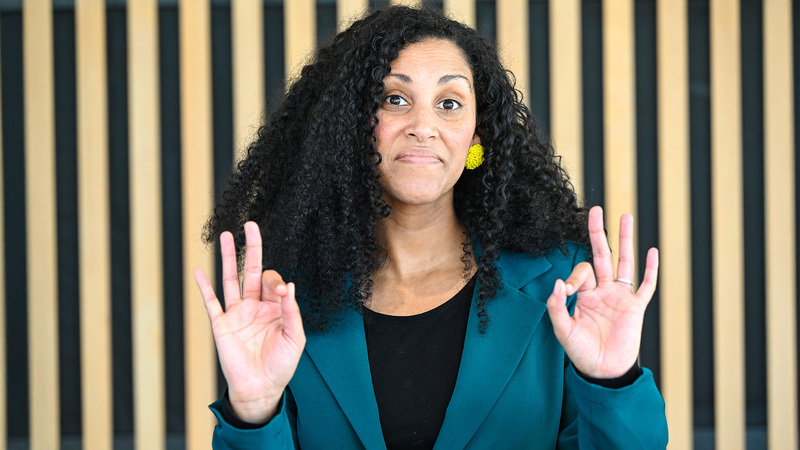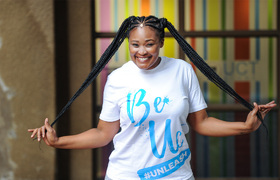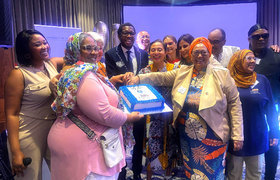UCT breaks ground with SASL website access
08 July 2025 | Story Myolisi Gophe. Photo Lerato Maduna. Read time 5 min.In a historic first for higher education in South Africa, the University of Cape Town (UCT) has launched a pilot project that makes its National Benchmark Test (NBT) website accessible in South African Sign Language (SASL).
The initiative, led by Michelle de Bruyn, UCT’s only full-time SASL interpreter, is a bold step towards inclusion for the country’s Deaf community and forms part of the university’s Vision 2030 strategy commitment to transformation.
De Bruyn, who was born by Deaf parents and joined UCT’s Disability Service in the Office for Inclusivity and Change (OIC) in 2023, describes her journey into Sign Language interpreting as a calling. “The first time I saw a Sign Language interpreter was at a meeting my dad dragged me to,” she recalled. “I was blown away. I knew then that this was something I wanted to do.”
“I recognised that while there was plenty of written information on the NBT website, there was almost nothing accessible to deaf users who use SASL.”
Two years later, De Bruyn is at the forefront of a transformation milestone that is setting new standards for accessibility in higher education. The project began with a simple but profound observation: “I recognised that while there was plenty of written information on the NBT website, there was almost nothing accessible to Deaf users who use SASL – a language that, importantly, has no written form.”
Recognising this gap, De Bruyn approached UCT’s Centre for Educational Assessments (CEA) – which manages the NBTs – with the idea of translating key parts of the admissions website into SASL. Timing was fortuitous: the unit was already planning a website upgrade. What followed was months of collaboration, planning and careful execution, involving stakeholders across UCT and external partners like the audio-visual team from One Button Studio based at UCT’s Centre for Innovation in Learning and Teaching (CILT).
“We first identified standard introductory information that wouldn’t change for at least three to five years,” she said. “Then I began interpreting those pages, recorded the content, checked it for accuracy, and worked with One Button Studio to film and produce the final product – all without any cost to the university, thanks to their willingness to support this pilot.”
When the NBT website upgrade stalled, De Bruyn and CEA Administrator, Lynia Norman, came up with a workaround: upload the SASL videos to NBTs’ YouTube channel and embed them on the website using clickable links. This simple yet effective solution now allows any prospective student – or their parent – to access the admissions content in SASL with the click of a button.
But this is only the beginning.
“This is the first time a tertiary institution in South Africa has made a website fully accessible in SASL,” De Bruyn noted. “It’s a massive milestone, and we hope to flagship this approach across UCT and eventually the sector.”
The initiative also resulted in the university hosting its first-ever Deaf prospective student who completed the NBT with the assistance of a Sign Language interpreter – another national first for the benchmark testing system.
Beyond the website, De Bruyn and the Disability Service have also created SASL-interpreted informational videos about the NBT process in collaboration with UCT Libraries. A video library tour of UCT’s Oppenheimer Library, for instance, is in SASL, English, isiXhosa and Afrikaans – also the first of its kind in the country.
Transforming UCT one website at a time
De Bruyn’s long-term vision is ambitious but achievable. “We’re now working to make the entire OIC website accessible in SASL before the end of the year,” she said. “Then we’ll tackle the admissions website.”
UCT currently employs just one full-time SASL interpreter – De Bruyn – and she acknowledges that the road ahead is long. But the commitment is unwavering. “We’re making strides. We don’t want SASL inclusion to be the exception. We want it to become the norm.”
For De Bruyn, accessibility is not just about websites – it’s about culture. Through UCT’s partnership with the Cape Town Deaf Community, the university has rolled out SASL training for frontline staff in libraries, traffic services, residences and the visitor centre. These sessions equip staff with basic communication skills and foster greater awareness of deaf culture.
“We’re identifying gaps and working to build a more inclusive, Deaf-friendly UCT – one department at a time.”
“This is a holistic effort,” she said. “We’re identifying gaps and working to build a more inclusive, Deaf-friendly UCT – one department at a time.”
The project aligns closely with UCT’s Vision 2030, which places transformation at the heart of the university’s strategy. By making information accessible in SASL, UCT is not only meeting the needs of a previously marginalised group – it is also redefining what inclusivity means in a digital age.
“Ultimately,” said De Bruyn, “I would love for every UCT website to be accessible in SASL. This isn’t just about meeting a legal requirement. It’s about creating a university where everyone belongs.”
 This work is licensed under a Creative Commons Attribution-NoDerivatives 4.0 International License.
This work is licensed under a Creative Commons Attribution-NoDerivatives 4.0 International License.
Please view the republishing articles page for more information.












